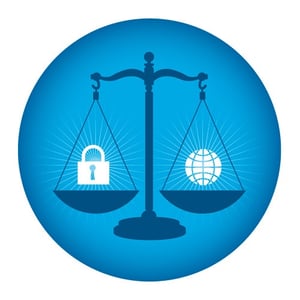 Hopefully you've taken a look at our guidelines in the new contractor manual. If you haven't, one of the important pieces deals with HIPAA and patient privacy. Now, it’s still important to take a look at the manual, but we want to make sure you have a brief rundown on HIPAA in the meantime.
Hopefully you've taken a look at our guidelines in the new contractor manual. If you haven't, one of the important pieces deals with HIPAA and patient privacy. Now, it’s still important to take a look at the manual, but we want to make sure you have a brief rundown on HIPAA in the meantime.
HIPAA stands for the Health Insurance Portability and Accountability Act. It’s designed to help workers all over the country safely maintain their health insurance. Part of the act deals with the ability to transfer health insurance from one company to another if you get a new job.
The part most important to you as a wellness professional, however, is the part that addresses the privacy of health information. In today’s digital age, this is especially important.
The act outlines quite a few details that you can check out on your own here. To simplify the legal jargon a bit, we’ve narrowed it down to three primary things we want all of our contractors to act on.
Accessibility: Make health information physically difficult to access.
- Keep forms and paperwork face down or covered when not in use.
- Don’t let participants keep their Consent Forms.
- Screening participants should walk away with their results written on a results booklet or handout.
- If a flu shot participant requires documentation that they received the shot they can:
- Complete two Consent Forms. TotalWellness will keep one and the participant will keep the other.
- Contact TotalWellness after the event and we can fax or securely email the participant a copy of their Consent Form.
- Don’t allow company to make copies of completed Consent Forms.
- Don’t leave forms or health data unattended.
- Don’t give any individual health data to the employer. They’re only allowed access to aggregate data, which TotalWellness provides after the event.
- Confirm you have the correct participant before discussing any health data.
Respect for Participants: Respect each participant and his or her individual situation.
- Leave work at work, meaning don’t discuss participant information with anyone when you leave the worksite.
- Avoid visible, verbal or nonverbal cues as to what health data you might be discussing. For example, if you are shocked by a participant’s numbers, don’t show it.
- Treat participants’ private information as you’d like yours to be treated.
Communication: Communicate carefully, clearly and efficiently with each participant.
- Speak to participants in a secure area where it’s unlikely you’ll be overheard.
- Speak to participants at a volume they can hear, but the rest of the room can’t hear.
- Point to health screening results rather than saying them out loud.
- Only discuss an individual’s health with that individual. This means don’t discuss it with other staff members, other participants or the employer.
- When calling participants to the health education station verify two participant data points to ensure you have the correct participant (IE. Name and Date of Birth).
HIPAA can be an overwhelming ruleset to learn. It’s important to take a look at the full act and what it entails. In practice, however, remember to maintain privacy in information accessibility and communication, and to have respect for all participants you see.
What questions do you have about HIPAA and patient privacy at our health and wellness events?


